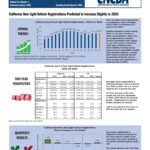While the idea of paying for a car with a stack of cash might seem straightforward, dealerships sometimes hesitate when faced with a cash deal. It’s legal tender, so why the apprehension? Despite cash being a valid form of payment, dealerships have valid reasons to be wary of large cash transactions. Let’s explore the primary reasons behind this suspicion.
The Increased Risk of Counterfeit Currency
Counterfeit money is a significant concern for businesses, and car dealerships are no exception. While sophisticated counterfeit credit cards are incredibly difficult to produce and use, fake paper currency is unfortunately more prevalent. Detecting counterfeit bills requires a trained eye and often specialized equipment. Outside of a bank, it can be challenging to identify fakes, as the subtle indicators are easily missed by untrained individuals. Dealership staff, while experienced, are not necessarily experts in currency authentication. Accepting a large sum of cash increases the risk of unknowingly taking in counterfeit bills. If a dealership unknowingly accepts fake cash, they bear the financial loss. Tracing someone who has paid with counterfeit money and provided false information is incredibly difficult and resource-intensive. Therefore, dealerships often prefer more secure and easily verifiable payment methods like credit or secured financing to mitigate this risk.
Cash Transactions and Association with Criminal Activity
Cash, due to its inherent nature, is harder to trace than electronic forms of payment. This lower traceability makes it a preferred method of transaction for illegal activities. While the vast majority of cash transactions are legitimate, and everyday citizens use cash regularly, its anonymity appeals to criminal organizations seeking to obscure the origins of their funds. Purchasing a high-value item like a car with cash can unfortunately be a way for individuals to legitimize illegally obtained money. By using cash, they can convert illicit gains into a tangible asset with a paper trail that, on the surface, appears legitimate. Dealerships are aware of this potential link, and large cash transactions can trigger red flags related to money laundering concerns. They must comply with regulations and are incentivized to avoid facilitating potentially illegal financial activities.
The Security Risks Associated with Handling Large Amounts of Cash
Unlike digital funds, physical cash is vulnerable to theft. Once paper currency is stolen, especially unmarked bills, recovery is nearly impossible. This is why most individuals and businesses do not keep significant portions of their assets in cash. Dealerships, particularly those in busy areas, become potential targets for theft if they regularly hold large amounts of cash on-site. Accepting a cash payment means the dealership must then handle and secure that physical money until it is deposited in a bank. This necessitates enhanced security measures to protect the cash, including reinforced safes, increased surveillance, and potentially more frequent and secure bank deposits. These added security protocols represent additional costs and logistical challenges for the dealership. Therefore, discouraging large cash payments is also a way for dealerships to minimize their risk of theft and the associated security burdens.
